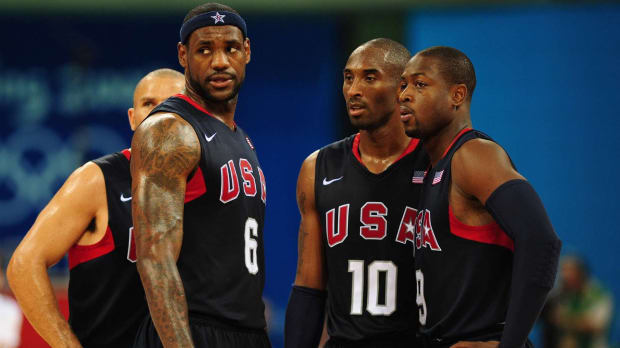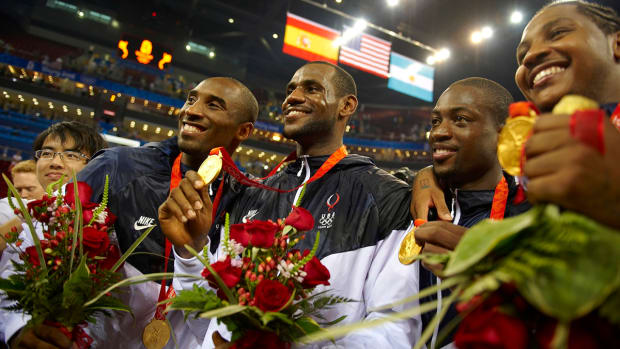In the opening frame of The Redeem Team, a 90-minute Netflix documentary that drops Friday, slightly younger versions of Kobe Bryant and LeBron James each take a seat on a red couch ahead of the 2008 Olympics.
It’s there that they field questions from interviewers about the upcoming Games in Beijing—ones that will present the Americans with an opportunity to avenge their embarrassing defeat in the 2004 Olympics. In light of that, Kobe gets asked: What would it mean to win a gold medal? And in what ways would that differ from perhaps winning an NBA championship?
Bryant’s response—that a restoration of national pride took precedent over everything else, and that he sensed even Celtics fans wearing Kevin Garnett jerseys could put their allegiance aside to root this once for the famed Laker—immediately sets the tone for the doc in more ways than one.

John Biever/Sports Illustrated
Yes, Redeem Team quickly explores the rich history of USA Basketball, the inner workings of the national team and the failure—a bronze finish in Athens—back in 2004 that ultimately made a sweeping overhaul in the organization necessary in the first place before winning it all in ’08. But like the Dream Team doc that dropped a decade ago, this Redeem Team one encompasses a few stories within the story. And the biggest focal point aside from the team itself is Bryant.
In separate strokes, the film highlights Bryant’s otherworldly work ethic and focus; his initial and sometimes icy standoffishness; and his whatever-it-takes attitude to pull his team over the line, both in practice sessions and in actual competition.
“Obviously this was back when there was the constant argument around the NBA and in barbershops about who was better, LeBron or Kobe. But Kobe was the biggest star on that team,” says Dwyane Wade, the Redeem Team’s leading scorer and an executive producer on the film. “As a team, we had a redemption story from [what happened in] 2004. But we had some personal redemption stories throughout it, too. And Kobe’s was obviously a big one.”
While the documentary gets into some of what Bryant was battling from a perception standpoint—his credentials as a teammate were under fire, given that he’d demanded a trade the summer before the Olympics—it does a bit of a Eurostep around one key point.
The film briefly, briefly sprints past the fact that Kobe made mention to police of Shaquille O’Neal’s alleged hush money payments to women years earlier, but ignores why Bryant was speaking with the police in the first place: the sexual-assault allegation, and eventual charge, against Kobe in 2003. (The criminal case would later be dropped after the woman, who’d received death threats, told prosecutors she was unwilling to testify. She later filed a lawsuit before eventually reaching a confidential settlement with Bryant.) That was an enormous part of why Bryant had dealt with perception issues during the mid to late 2000s, even if his popularity remained sky-high among fans around the world, as is shown in the film.
The other omission, though far less glaring: While Kobe and LeBron developed a good rapport by all accounts, as is shown in the documentary, at least one tension seemed close to bubbling to the surface during the Olympic run, yet wasn’t touched on in the film.
In Ian O’Connor’s book, Coach K, released earlier this year, the longtime reporter recreates a scene in which James pressed Team USA coach Mike Krzyzewski to get in Bryant’s ear about his poor shot selection, which was hindering the team during an exhibition game with Australia. “Yo coach, you’d better fix that motherf---er,” James told Krzyzewski, according to the book.
“That did happen,” Krzyzewski confirmed in an interview with Sports Illustrated. “We didn’t want [Kobe’s poor shot selection] to be a habit, so it was my responsibility to talk to Kobe about it. And he was great. He said, ‘You’re right.’ … Because of the impact that sort of thing could have on the others, it had to be talked about. But Kobe owned it, and after that, it was irrelevant.”
Still, even with those storytelling opportunities left out, there’s plenty here. There’s solid context and behind-the-scenes footage of Coach K’s talks with the Team USA roster, ones he explains mattered quite a bit at the time. While it’s easy now to assume Krzyzewski, a West Point alum, would’ve had the immediate buy-in from the stars, he was still a college coach—granted, an incredibly accomplished one—from a Duke program that a number of players didn’t necessarily care for growing up.
“I think that period was more about letting them know who I was, and letting them know they could be themselves,” Krzyzewski says. “That and speaking to them in simple terms.”

Bob Rosato/Sports Illustrated/Getty Images
Plenty was shown with James and Bryant, with James often cracking jokes to break the proverbial ice with his fellow superstar. This same interplay took place between Michael Jordan and Magic Johnson—the two best players in the world in the early 1990s—in the Dream Team doc, though Jordan seemed determined to dethrone Johnson far more than James did with Bryant.
The Redeem Team scenes from Las Vegas were great, showing how the team not only trained, but also bonded every summer for weeks at a time to prepare for the 2008 Games. They foreshadow how a handful of players—James, Wade and Chris Bosh, specifically—could later join forces as friends to become star teammates in the NBA.
And while the film isn’t necessarily a historical deep dive, there is enough history there. The Dream Team’s backstory. The Redeem Team’s backstory. And, in what made for a full-circle moment, the backstory of what happened with Doug Collins and Team USA in the 1972 Olympics in Munich.
“I think [the Redeem Team’s] legacy is, we reestablished the standard,” Wade says. “In the media, I think they just see us as NBA players, and not a team, necessarily. Spoiled, Black athletes. But we went out and supported other American athletes at the Olympics. We were gracious, and went out and shook hands afterwards with the teams we beat down by 50. We went out and did the work, and showed who we were: one of the greatest teams to ever play.”







